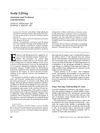 96 citations,
July 2014 in “Cold Spring Harbor Perspectives in Medicine”
96 citations,
July 2014 in “Cold Spring Harbor Perspectives in Medicine” The document concludes that adult mammalian skin contains multiple stem cell populations with specific markers, important for understanding skin regeneration and related conditions.
4 citations,
October 2021 in “Microorganisms” Men with androgenetic alopecia have different scalp oils and microbes compared to those without.

New treatments for hair loss should target eight main causes and use specific plant compounds and peptides for better results.
 3 citations,
April 2022 in “International Journal of Molecular Sciences”
3 citations,
April 2022 in “International Journal of Molecular Sciences” Scientists turned mouse skin cells into hair-inducing cells using chemicals, which could help treat hair loss.
 May 2023 in “Journal of Clinical Medicine”
May 2023 in “Journal of Clinical Medicine” New understanding and treatments for hair loss are improving, but more research is needed.

Nanocarriers with plant extracts show promise for safe and effective hair growth treatment.

Arabica coffee pulp extract may help prevent hair loss and promote hair growth.
 13 citations,
September 2021 in “Current Issues in Molecular Biology”
13 citations,
September 2021 in “Current Issues in Molecular Biology” Dexpanthenol helps human hair follicle cells grow by preventing aging and death, and by supporting growth signals.
 24 citations,
January 2015 in “Annals of Dermatology”
24 citations,
January 2015 in “Annals of Dermatology” Herbal extracts may help hair grow and could be an alternative to synthetic hair loss treatments.
 34 citations,
April 2009 in “Expert Opinion on Pharmacotherapy”
34 citations,
April 2009 in “Expert Opinion on Pharmacotherapy” Some treatments work for common baldness, but there's less evidence for other hair loss types, and more research is needed.
 3 citations,
February 2023 in “International Journal of Molecular Sciences”
3 citations,
February 2023 in “International Journal of Molecular Sciences” Autologous Platelet and Extracellular Vesicle-Rich Plasma (PVRP) has potential in enhancing tissue regeneration and improving hair conditions, but its effectiveness varies due to individual differences.
December 2023 in “Pharmaceutics” The new adhesive nanoparticles are effective for delivering Minoxidil to the scalp without skin irritation.
 January 2024 in “Biomedicines”
January 2024 in “Biomedicines” Using stem cells from hair follicles to treat female hair loss is safe and effective after six months.
 October 1890 in “Science”
October 1890 in “Science” Pilocarpin can cause hair regrowth and color change in some cases but not in others, and it may have side effects in animals.
 January 2024 in “International Journal of Molecular Sciences”
January 2024 in “International Journal of Molecular Sciences” Blocking the protein CXCL12 with a specific antibody can increase hair growth in common hair loss conditions.
 7 citations,
December 2022 in “Plants”
7 citations,
December 2022 in “Plants” Guava leaf extract may help treat hair loss and protect cells by blocking certain genes and fighting damaging molecules.
 December 2021 in “International journal of minor fruits, medicinal and aromatic plants”
December 2021 in “International journal of minor fruits, medicinal and aromatic plants” The document concludes that in Sri Lanka, 25 common plants are traditionally used as home remedies for various health issues due to their medicinal properties.
1 citations,
July 2022 in “British Journal of Dermatology” Targeting specific genes in certain pathways may help treat male pattern baldness.
17 citations,
November 2021 in “Journal of Cosmetic Dermatology” Combination therapies for androgenetic alopecia work best but can have significant side effects and costs.
 55 citations,
November 2018 in “American journal of human genetics”
55 citations,
November 2018 in “American journal of human genetics” Mutations in the LSS gene cause a rare type of hereditary hair loss.
 May 2015 in “Journal of The American Academy of Dermatology”
May 2015 in “Journal of The American Academy of Dermatology” Oral minoxidil effectively increases hair growth in male baldness but can cause side effects like excessive hair growth and swelling.
 25 citations,
October 2018 in “Journal of The American Academy of Dermatology”
25 citations,
October 2018 in “Journal of The American Academy of Dermatology” Erosive pustular dermatosis of the scalp is a type of skin inflammation often confused with other conditions, requiring continuous treatment.
 November 2023 in “International Journal of Dermatology”
November 2023 in “International Journal of Dermatology” Trichoscopy helps tell apart other hair loss conditions from common hair loss.
March 2023 in “Clinical, Cosmetic and Investigational Dermatology” Spironolactone can effectively treat hair loss with manageable side effects.
 5 citations,
September 1994 in “The Journal of Dermatologic Surgery and Oncology”
5 citations,
September 1994 in “The Journal of Dermatologic Surgery and Oncology” Scalp lifting surgery can safely and effectively reduce baldness if done with careful planning and proper technique.
 46 citations,
December 1992 in “Journal of Investigative Dermatology”
46 citations,
December 1992 in “Journal of Investigative Dermatology” Minoxidil decreases LH expression, while hydralazine has mixed effects on prolyl and lysyl hydroxylase activities.
 May 2024 in “International journal of research in dermatology”
May 2024 in “International journal of research in dermatology” Low vitamin D levels are linked to increased risk of male pattern baldness.
 2 citations,
May 2017 in “InTech eBooks”
2 citations,
May 2017 in “InTech eBooks” Stem cells could improve hair growth and new treatments for baldness are being researched.

Men with hair loss are seen as less attractive and shorter, and height is a key factor in attractiveness ratings.
 25 citations,
March 2017 in “Journal of Dermatological Treatment”
25 citations,
March 2017 in “Journal of Dermatological Treatment” Platelet-rich plasma treatment for non-scarring hair loss shows mixed results and needs more research.
























